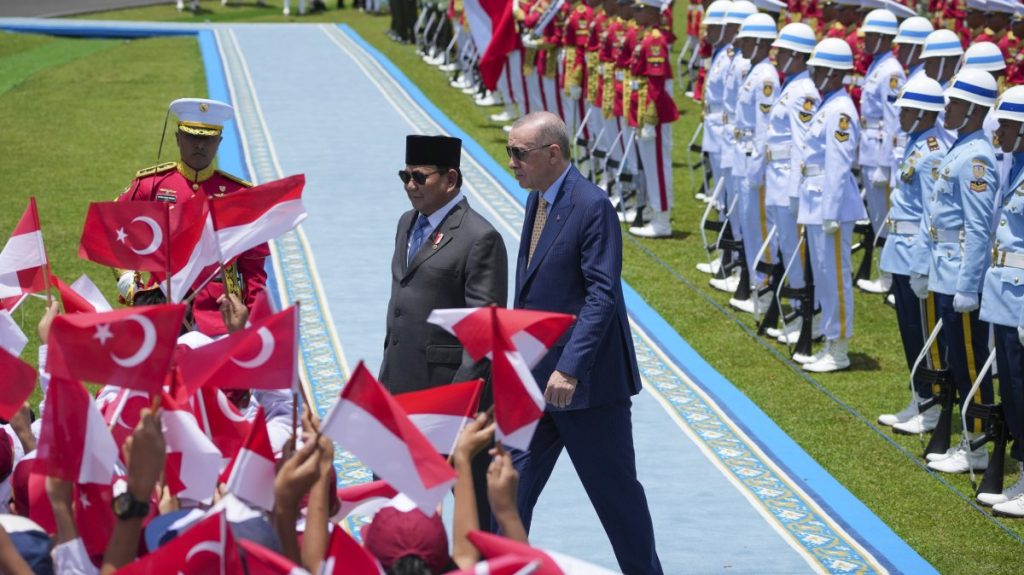Following President Recep Tayyip Erdoğan’s invitation during his visit to Indonesia last February, Indonesian President Prabowo Subianto is conducting a state visit to Ankara this week. During the last meeting in Jakarta, Indonesians warmly welcomed Mr. Erdoğan. Mr. Prabowo personally greeted Mr. Erdoğan upon arrival at the airport, escorted him to the hotel and then sent him off again at the airport upon his departure. A cavalry unit of 75 personnel was prepared and more than 5,000 students and members of the public welcomed Mr. Erdoğan along the route to Bogor Palace, where the meeting took place. Mr. Erdoğan expressed that he was deeply moved and had never witnessed such a reception during his entire political career.
What is more important is the productive meeting between the two leaders. They agreed firmly that Indonesia and Türkiye need to usher in a new chapter of strategic partnership. No less than 13 cooperation agreements in various fields, ranging from energy and industry to education and religious affairs, were agreed upon. These areas of cooperation can continue to expand into other strategic sectors.
Adding to the warm and cordial relations between them, the two presidents also exchanged unique souvenirs symbolizing the significance of historical ties between the two nations. Mr. Prabowo presented a domestically produced 5.56 x 46 mm caliber SS2-V4A2 assault rifle, known for its accurate firing precision and featuring a special engraving of Mr. Erdoğan’s name. Additionally, Mr. Prabowo gifted a Balinese kris with a silver hilt wrapped in gold and adorned with ruby gemstones. The Kris is an ancient traditional weapon of the Indonesian people, symbolizing strength and love for God Almighty.
Meanwhile, Mr. Erdoğan presented a white vase with pink floral ornaments and a calligraphy piece. The calligraphy contained a poem expressing the prayers and gratitude of the Javanese people of the past to Sultan Abdulmecid Khan, Muhammad Hasib Pasha, the Governor of Hejaz and the Sheikh of the Holy Land for ensuring the safety and peace of the holy sites, as well as the well-being through a just governance of the ummah. Indeed, cultural relations might serve as a strong foundation and reminder between the two countries that share similar aspirations to provide prosperity to their people.
Having a very strong foundation in bilateral relations, Indonesia and Türkiye, as middle powers and countries with a majority Muslim population, have a strategic role in continuing to promote the spirit of peace, particularly regarding the conflict in Palestine. Indonesia’s position remains the same: it supports a lasting peace for Palestine through a two-state solution and realizes stability in the Middle East. Although not a participant in the Arab Summit, Indonesia fully supports the commitment of the Cairo Declaration last March to rebuild the Gaza Strip, as it resonated at the ministerial meeting of the Organisation of Islamic Cooperation (OIC). Furthermore, the Indonesian government, together with the Indonesian Ulama Council (MUI) and the National Alms Agency (Baznas), is conducting a campaign to raise $200 million in humanitarian aid for Palestine.
It also has to be mentioned that there certainly is a large area for improved trade relations between Indonesia and Türkiye, which is in line with the previous agreement to increase balanced trade to $10 billion.
United in multilateralism
The world has now changed in the direction of bilateralism, which is partly forced by the geopolitical rivalry between the U.S. and China. While bilateralism serves to help any two countries fend off the uncertainties and consequences as a result of the above-mentioned geopolitical rivalry, the world is just too complex for any two countries to handle whatever challenges arise from international relations between nations. Also, international relations are not only about the U.S. and China.
Against this backdrop, Indonesia and Türkiye possess strong modalities to uphold the spirit of multilateralism in the current global landscape. First, both nations are countries with a strong commitment to peaceful resolution, dialogue, and inclusivity, which positions them as natural advocates for international cooperation. Both countries have been active and can actively leverage platforms like the Developing Eight (D-8) and the OIC to champion collective action on the development agenda, fostering a sense of solidarity and shared responsibility among the developing countries.
Furthermore, the two nations have also consistently and continuously strived for the betterment of international institutions. As influential middle powers, their voices carry weight in discussions surrounding the United Nations reform, the World Bank, the IMF, and other multilateral bodies.
By forging closer strategic relations with other like-minded nations, Türkiye and Indonesia can build momentum for changes that ensure a more equitable distribution of power and a more responsive international system to the needs of developing countries. Indonesia and Türkiye’s active engagement in initiatives like MIKTA (Mexico, Indonesia, South Korea, Türkiye, Australia) provides a platform to build consensus and propose constructive reforms that strengthen the legitimacy and effectiveness of multilateral institutions.
In a period of international relations that tends to lean toward bilateralism, Türkiye and Indonesia, as middle powers, have a crucial role in maintaining the spirit of multilateralism to encourage cooperation among developing countries in achieving shared development and other strategic interests. The visit by President Prabowo to Türkiye this week might pave the way for pursuing those aspirations.


